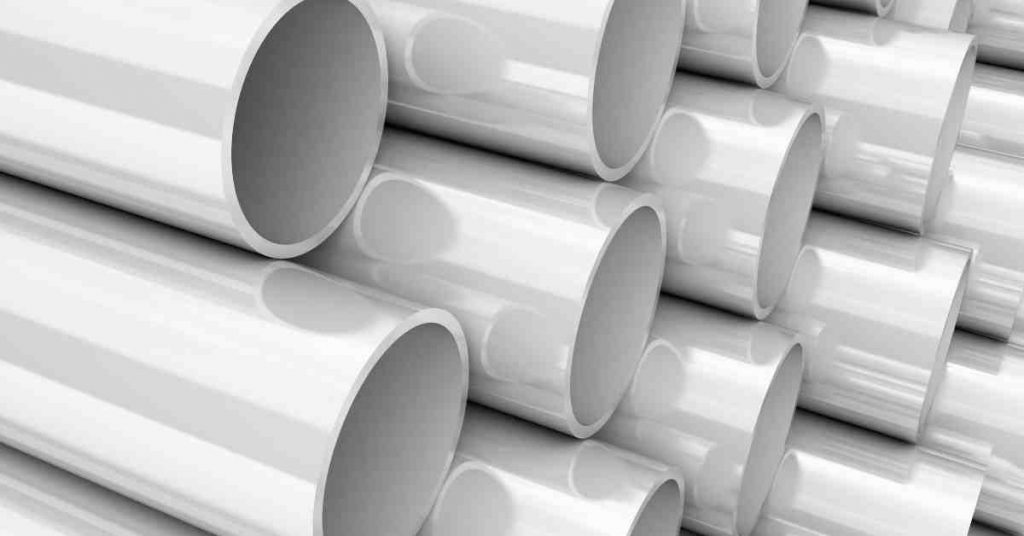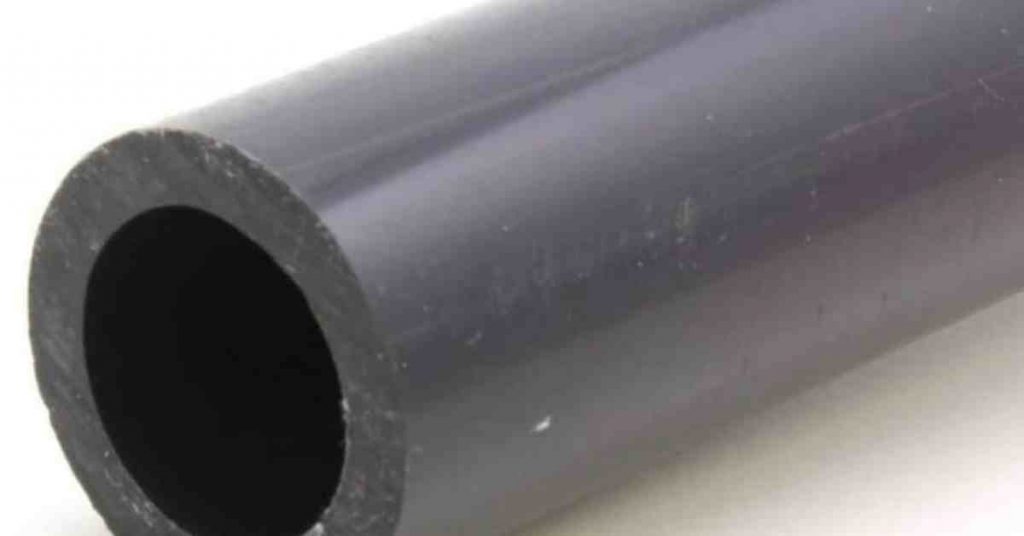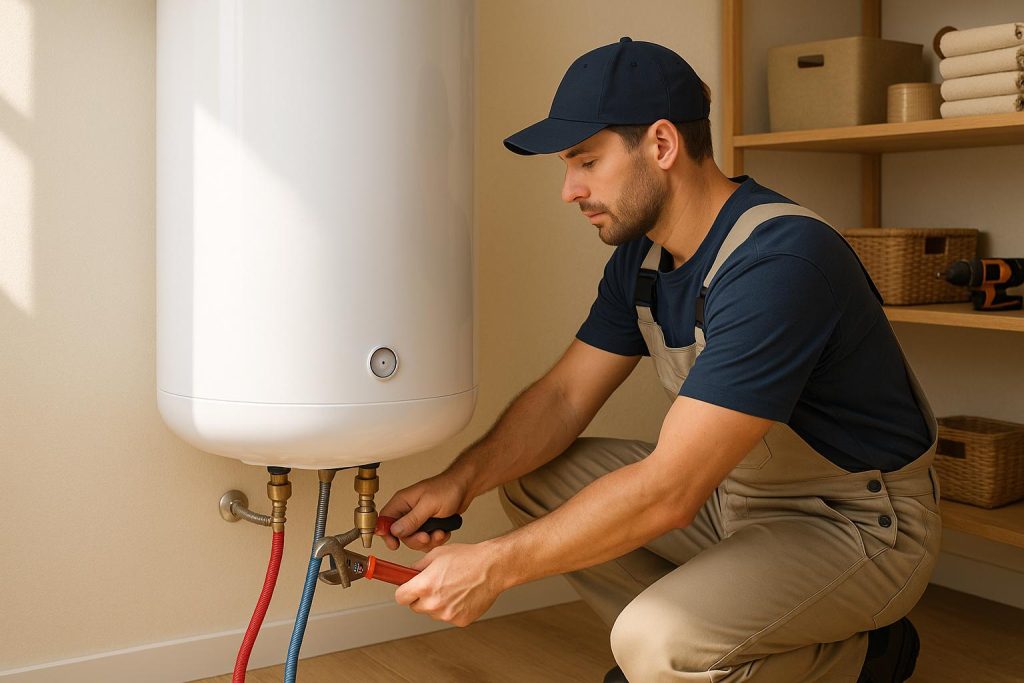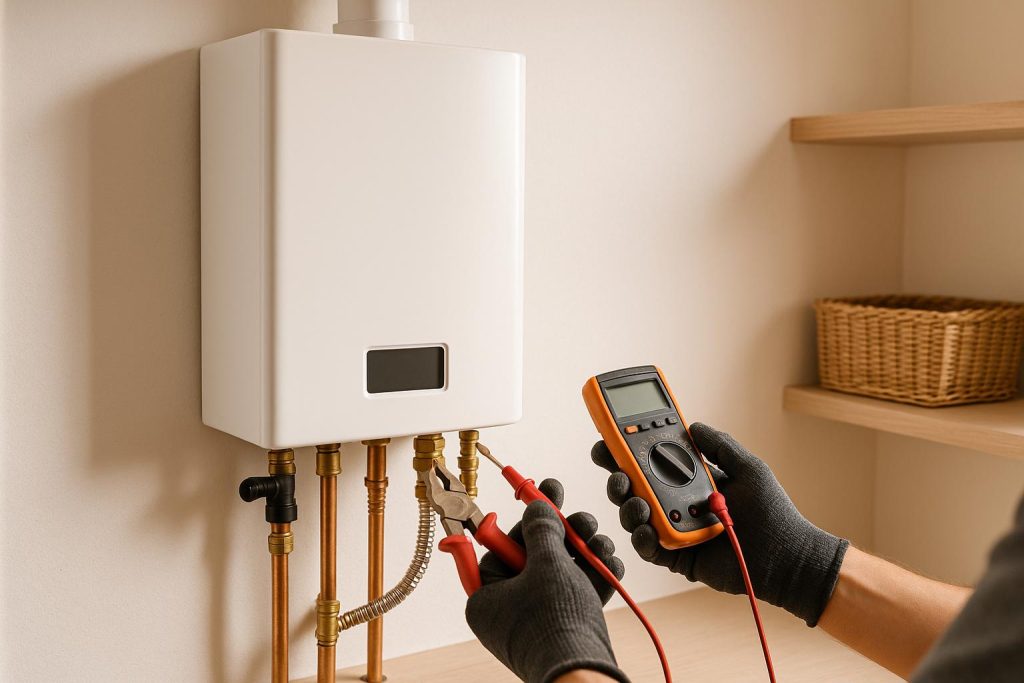PVC (polyvinyl chloride) comes handy when manufacturing drain pipes as well as electrical conduit pipes. But are electrical PVC pipes the same as plumbing PVC pipes?
Electrical PVC pipes are not the same as plumbing PVC pipes. To start with, electrical PVC pipes are usually gray while plumbing PVC pipes are white. Plumbing PVC pipes are also made thick to withstand pressure while electrical PVC conduits are thinner and are not pressure-tested.

The main difference between plumbing PVC and electrical conduit PVC pipes is that plumbing PVC pipes are thicker, pressure-tested and rated while electrical PVC conduits are thinner and not pressure-tested. Electrical PVC pipes are usually grey and will resist ultraviolet degradation while plumbing PVC pipes are white and will degrade when exposed to ultraviolet light.
Electrical conduit PVC pipes cannot be used for water or drainage purposes. These pipes are usually not pressure-tested hence might result in leaks when used as drain pipes. The stabilizers and other substances used in the PVC pipes may also be toxic and there not safe for drinking water.
Electrical conduit PVC pipes are designed to protect electrical cables therefore have thin walls and never pressure-tested. If the same were used for plumbing, the drain water which is usually under pressure can cause cracks and therefore leakage.
Here’s a table highlighting the key differences between plumbing PVC pipes and electrical PVC pipes:
| Attribute | Plumbing PVC Pipes | Electrical PVC Pipes |
|---|---|---|
| Material Composition | Made of PVC (Polyvinyl Chloride) resin, designed for carrying water and other fluids. | Also made of PVC resin but formulated specifically for electrical applications. |
| Color | Typically white or gray in color. | Usually gray or other non-standard colors, like orange or blue. |
| Diameter | Available in various diameters to accommodate different plumbing needs (e.g., 1/2 inch to 12 inches or more). | Typically available in smaller diameters (e.g., 1/2 inch to 6 inches) suitable for electrical conduits. |
| Wall Thickness | Plumbing PVC pipes often have thicker walls to withstand water pressure and external forces. | Electrical PVC pipes have thinner walls since they primarily serve as protective conduits for wiring. |
| Markings | May be marked with specifications related to pressure ratings, temperature limits, and pipe size. | Often marked with electrical codes and specifications, including conduit type and size. |
| Usage | Used for conveying potable water, waste water, and various fluids in plumbing systems. | Primarily employed as protective conduits for electrical wires and cables in residential and commercial wiring. |
| Fittings | Utilizes plumbing-specific fittings like elbows, tees, and couplings to create complex plumbing systems. | Uses electrical fittings such as connectors, adapters, and junction boxes to facilitate wiring connections. |
| Codes and Standards | Subject to plumbing codes and standards, including ASTM and ANSI specifications. | Subject to electrical codes and standards, like NEC (National Electrical Code) regulations. |
| Electrical Insulation | Not designed for electrical insulation but may have some insulating properties. | Designed to provide electrical insulation and protect wiring from environmental factors. |
| UV Resistance | Typically not UV-resistant and may degrade when exposed to sunlight. | May be UV-resistant, as electrical conduits may be exposed to outdoor conditions. |
| Fire Resistance | Generally has limited fire resistance. | Often designed to be flame-retardant to meet electrical safety standards. |
| Application Environment | Used in indoor and outdoor plumbing systems, including residential and commercial applications. | Primarily used indoors but can also be used outdoors when properly protected. |
| Cost | Plumbing PVC pipes are generally less expensive due to their common use and availability. | Electrical PVC pipes may be slightly more expensive due to their specialized formulation and features. |
Can I use plumbing PVC for Electrical Conduit?

Can I use white PVC for electrical conduit? Or rather can I glue white PVC to gray PVC?
You can, but you shouldn’t. Plumbing and electrical PVC pipes are color-coded for ease of identification and to ensure that each pipe is used for its intended purpose to avoid damages or even accidents. Furthermore, the National Electrical Code requires that all electrical components be approved for their intended use by a national testing agency.
What is interesting though is that plumbing PVC and electrical conduit PVC pipes are of the same size. A 2-inch plumbing PVC fitting will fit on a 2-inch electrical conduit PVC pipe.
While that is the case, avoid using plumbing PVC pipes for electrical installation. And here is one of the main reasons:
Since electrical PVC pipes are gray, if you use white plumbing PVC pipes instead for electrical installations someone will think it is a harmless drain pipe and interfere with it totally unaware of the underlying danger.
Also, gray white plumbing pipes if left exposed in the open (as is the case with electrical conduits), will harden and after sometime crack. That will dangerously expose the cables inside.
In short, just use the right PVC pipe for the right job. Resist taking shortcuts even if there is a perfect coupling or fitting lying around.
The Differences

Let us now look at the main differences between plumbing PVC pipes and electrical conduit PVC pipes in more details:
1. Pressure Rating
In plumbing, I cannot think of something worse than having leaks in your drain lines. For that very reason, plumbing PVC pipes are made in such a way that they can withstand the pressure of the water being drained out of the house.
While buying a plumbing PVC pipe, check out the pressure rating which is always stamped on the pipe. It helps you understand if the pressure rating of the pipe will satisfy your plumbing needs.
On the other hand, electrical conduit PVC pipes are never pressure tested. And you really don’t need to.
Unlike water, electrical current is never under pressure and will therefore never leak (if such a thing is possible).
This is the main reason why you should not use an electrical conduit PVC pipe for plumbing. The drain water will subject the pipe to more pressure than it can withstand resulting in cracks and therefore leaks.
2. Wall Thickness
If you have heard the term “schedule” in plumbing, this is where it comes in. Schedule simply refers to the thickness of a pipe’s wall.
As I have said, plumbing PVC pipes are made to withstand way more pressure than electrical conduit PVC pipes can.
One way of ensuring that plumbing PVC pipes can withstand the pressure is by making them thick. Plumbing PVC pipes are therefore thicker than their electrical conduit PVC pipes counterparts.
Needless to say, a thick pipe will withstand more pressure before it bursts compared to thin pipes.
You should however remember that there are 2 schedules of PVC pipes. These are the schedule 40 PVC pipes and schedule 80 PVC pipes.
I have written a detailed guide about the differences between schedule 40 and schedule 80 PVC pipes in this post.
In short, schedule 80 PVC pipes have thicker walls than schedule 40 PVC pipes of the same nominal size. As a result, schedule 80 PVC pipes can withstand more pressure than schedule 40 PVC pipes.
In terms of applications, schedule 40 PVC pipes are what you would usually use for plumbing purposes in your house. Schedule 80 PVC pipes on the other hand are used in industrial and chemical applications.
3. Color

One of the most noticeable difference between plumbing PVC pipes and electrical conduit PVC pipes is their color. By standard, plumbing PVC pipes are white while electrical conduit PVC pipes are gray in color.
It is however important to mention that not all PVC pipes manufacturers adhere to this practice. Don’t be therefore be surprised to see a plumbing PVC pipe that is red.
Another thing to remember is that schedule 80 plumbing PVC pipe is gray, just like electrical conduit PVC pipes. You therefore need to be careful since as I have mentioned such a pipe should not be used for electrical installations.
4. Ultraviolet Degradation
Plumbing PVC pipes will undergo degradation when exposed to ultraviolet light, that is why these pipes are ideally buried in the ground or concealed in walls to maintain their structural integrity.
When exposed to ultraviolet light for a long time, the pipes become brittle and will crack easily. That however is not the case with electrical conduit PVC pipes.
Electrical conduit PVC pipes are specifically made to resist ultraviolet degradation and are therefore suitable for waterproofing applications and hence have no issues being installed in rooftops and other exposed spaces.
5. Installation
Electrical conduits have tapered ends, which allows them to be connected together without the need to use a coupler. The installation process is therefore very easy and quite fast.
On the other hand, PVC plumbing pipes will need couplers and PVC cement to connect them together. The installation process is therefore a little harder and slow too.
That however makes perfect sense since as I have mentioned, plumbing PVC pipes are expected to handle liquids under pressure and hence need to be properly sealed. That is however not a problem for electrical conduit PVC pipes.
6. Applications
To sum everything up, plumbing PVC pipes are ideally designed to carry fluids away from drains under pressure, while electrical PVC pipes are simply a conduit for electric cables.
To give you an idea, a 2-inch schedule 40 PVC pipe is designed to carry liquids with pressures of up to 280 psi (pounds per square inch). A similar size of an electrical PVC conduit would not be pressure-tested.
Although plumbing PVC pipes are thicker than electrical PVC pipes, they cannot be used where they are exposed to ultraviolet light. Ideally they should be installed indoor or underground.
Plumbing PVC pipes and electrical conduit PVC pipes should not be used interchangeably. It is best to use each pipe in the application it is suitable and designed for.
And basically those are the differences between plumbing PVC pipes and electrical conduit PVC pipes. I hope this guide was helpful.





